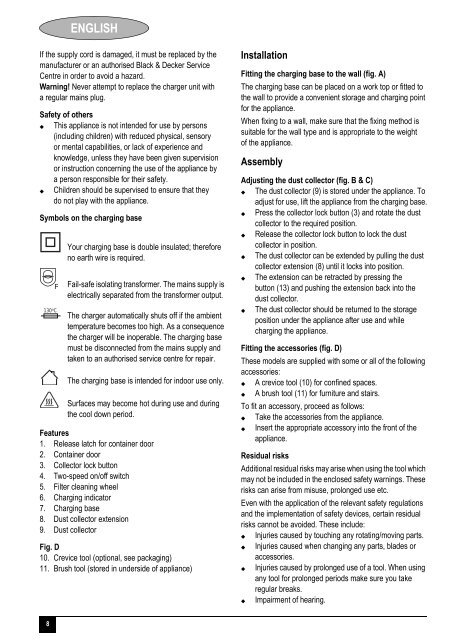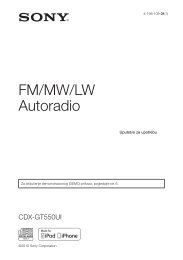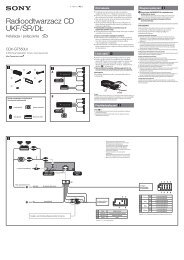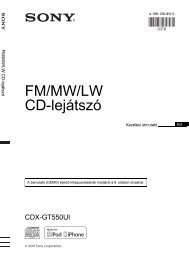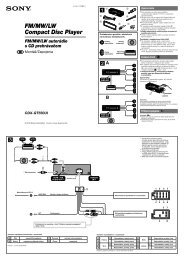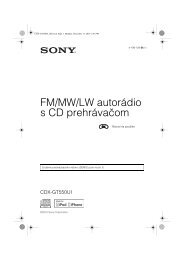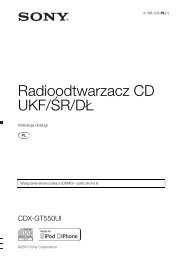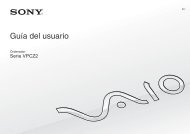BlackandDecker Aspiratori Ricaricabili Portatili- Pv1805 - Type H2 - Instruction Manual (Europeo)
BlackandDecker Aspiratori Ricaricabili Portatili- Pv1805 - Type H2 - Instruction Manual (Europeo)
BlackandDecker Aspiratori Ricaricabili Portatili- Pv1805 - Type H2 - Instruction Manual (Europeo)
You also want an ePaper? Increase the reach of your titles
YUMPU automatically turns print PDFs into web optimized ePapers that Google loves.
ENGLISH<br />
If the supply cord is damaged, it must be replaced by the<br />
manufacturer or an authorised Black & Decker Service<br />
Centre in order to avoid a hazard.<br />
Warning! Never attempt to replace the charger unit with<br />
a regular mains plug.<br />
Safety of others<br />
This appliance is not intended for use by persons<br />
(including children) with reduced physical, sensory<br />
or mental capabilities, or lack of experience and<br />
knowledge, unless they have been given supervision<br />
or instruction concerning the use of the appliance by<br />
a person responsible for their safety.<br />
Children should be supervised to ensure that they<br />
do not play with the appliance.<br />
Symbols on the charging base<br />
130 o C<br />
Your charging base is double insulated; therefore<br />
no earth wire is required.<br />
Fail-safe isolating transformer. The mains supply is<br />
electrically separated from the transformer output.<br />
The charger automatically shuts off if the ambient<br />
temperature becomes too high. As a consequence<br />
the charger will be inoperable. The charging base<br />
must be disconnected from the mains supply and<br />
taken to an authorised service centre for repair.<br />
The charging base is intended for indoor use only.<br />
Surfaces may become hot during use and during<br />
the cool down period.<br />
Features<br />
1. Release latch for container door<br />
2. Container door<br />
3. Collector lock button<br />
4. Two-speed on/off switch<br />
5. Filter cleaning wheel<br />
6. Charging indicator<br />
7. Charging base<br />
8. Dust collector extension<br />
9. Dust collector<br />
Fig. D<br />
10. Crevice tool (optional, see packaging)<br />
11. Brush tool (stored in underside of appliance)<br />
Installation<br />
Fitting the charging base to the wall (fig. A)<br />
The charging base can be placed on a work top or fitted to<br />
the wall to provide a convenient storage and charging point<br />
for the appliance.<br />
When fixing to a wall, make sure that the fixing method is<br />
suitable for the wall type and is appropriate to the weight<br />
of the appliance.<br />
Assembly<br />
Adjusting the dust collector (fig. B & C)<br />
The dust collector (9) is stored under the appliance. To<br />
adjust for use, lift the appliance from the charging base.<br />
Press the collector lock button (3) and rotate the dust<br />
collector to the required position.<br />
Release the collector lock button to lock the dust<br />
collector in position.<br />
The dust collector can be extended by pulling the dust<br />
collector extension (8) until it locks into position.<br />
The extension can be retracted by pressing the<br />
button (13) and pushing the extension back into the<br />
dust collector.<br />
The dust collector should be returned to the storage<br />
position under the appliance after use and while<br />
charging the appliance.<br />
Fitting the accessories (fig. D)<br />
These models are supplied with some or all of the following<br />
accessories:<br />
A crevice tool (10) for confined spaces.<br />
A brush tool (11) for furniture and stairs.<br />
To fit an accessory, proceed as follows:<br />
Take the accessories from the appliance.<br />
Insert the appropriate accessory into the front of the<br />
appliance.<br />
Residual risks<br />
Additional residual risks may arise when using the tool which<br />
may not be included in the enclosed safety warnings. These<br />
risks can arise from misuse, prolonged use etc.<br />
Even with the application of the relevant safety regulations<br />
and the implementation of safety devices, certain residual<br />
risks cannot be avoided. These include:<br />
Injuries caused by touching any rotating/moving parts.<br />
Injuries caused when changing any parts, blades or<br />
accessories.<br />
Injuries caused by prolonged use of a tool. When using<br />
any tool for prolonged periods make sure you take<br />
regular breaks.<br />
Impairment of hearing.<br />
8


